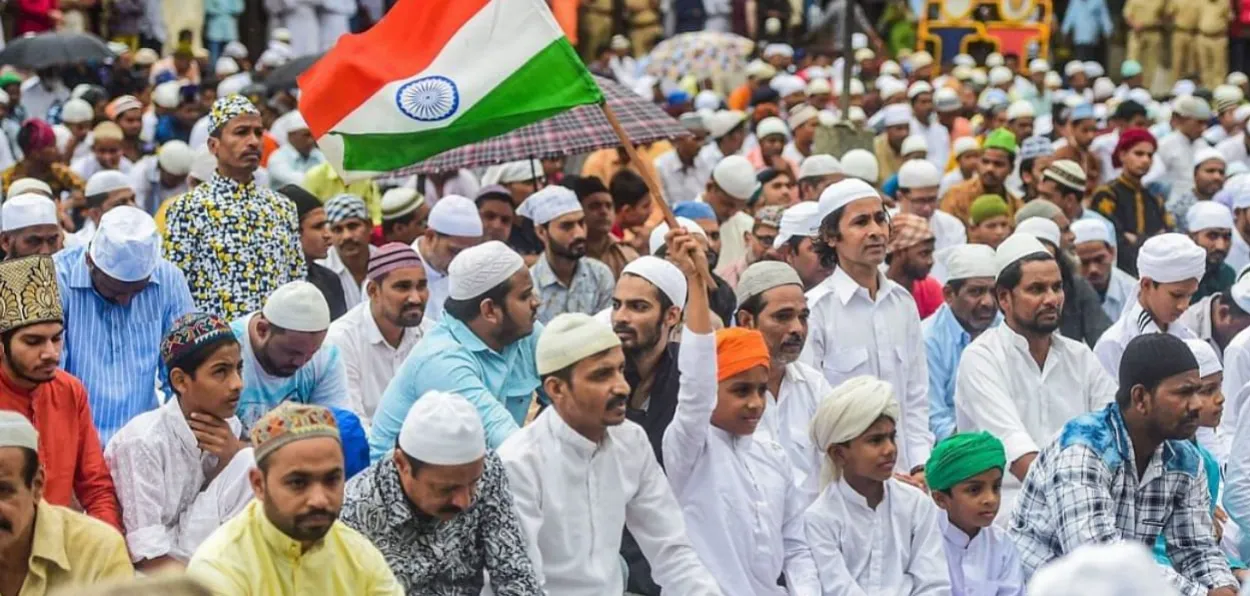
New Delhi
The Muslim Rashtriya Manch (MRM) has advocated out-of-the-court settlement between Hindus and Muslims on disputes over the ownership of their religious places in the interests of communal harmony and progress.
In a statement released for the media, MRM said “Wherever there is a dispute going on in the court between the parties, it would be better for any civilized society that both the parties talk to each other and reach an “out-of-court settlement”.
The MRM, the Muslim unit of the Rashtriya Swayemnsevak Sangh (RSS), has thus taken the bold initiative of seeking settlements over disputes.
Shahid Saeed, national convener and media in-charge of Muslim Rashtriya Manch, said that courts are the most important but solutions should be found through dialogue on disputed religious sites. Due to this the unity, integrity, harmony, brotherhood, and harmony of the country are maintained and there is no mutual hostility.
The Manch appealed to the Muslims of the country to respect the statement made by Sangh chief Mohan Bhagwat for the national interest of 142 crore people and also show a big heart and pledge to take India on the path of development.
The MRM announced that the controversial structures built at places like Kashi, Mathura, and Sambhal should be handed over to the Hindu community after holding a dialogue. Alongside this, the mosques where prayers are not being offered for some reason or are lying deserted should be handed over to Muslims.
Based on Islamic principles, the Manch clarified that idol worship is not permitted in Islam. Offering prayers in mosques where broken idols are found or where there is historical, social, or direct evidence of the existence of temples is against Islamic principles.
“Prayers are not accepted at such a place. Citing the Quran and Hadith, the Manch said that building a mosque on forcibly occupied,” the statement said.
In an online meeting of the Manch held on Friday in which activists and MRM members from all over the country participated. All the speakers suggested handing over the disputed places of worship to the Hindu community, following the principles of Islamic teachings and brotherhood. Supporting the MRM’s proposal for out-of-the-court settlement of Mandir-masjid disputes, Muhammad Afzal said, “We aim to bring harmony in the society. For India to move forward, we must work towards collective unity and development.”
Abu Bakar Naqvi said that we aim to respect each other's religion. This step is a symbol of the fact that the Muslim community of India is fully dedicated to the path of development of the country. While fulfilling our responsibilities, we should work for the betterment of the country.
Syed Raza Hussain Rizvi said that our society needs to move forward while always staying connected to its roots. Irfan Kachchhvi said that it is our resolve to move forward on the truth and the right path, not to clash but to walk together. We support this initiative because it promotes goodwill and brotherhood in our society. If we accept it, we move towards Indian unity.
Shiraz Qureshi said that the Manch is trying to take a bold step towards making India prosperous and peaceful. We emphasize that no religious place should be occupied by force. In this way, hatred will end and humanity will increase. This step taken by the Muslim Rashtriya Manch will set a new example of unity and respect in Indian society. All communities will have to play their role to end communal tensions, and this step will certainly help in making India a prosperous country.
This call of the Manch has received strong support from various Muslim organizations, intellectuals, and social workers. Everyone believes that this step will usher in a new era of peace and unity in India, which will lead the country on the path of development and harmony. It was demanded that the disputed sites be handed over to the Hindu community based on historical evidence, traditional and direct evidence, and evidence found in excavations.
The MRM has decided to appeal to Muslims to follow Islamic principles and not offer prayers at places that are disputed or have been built by demolishing other religious places. It asked the government to use constitutional measures to restore the disputed places to their rightful owners. ‘Only if an issue is not resolved through talks, then everyone should accept the court's verdict.”
